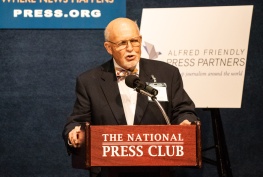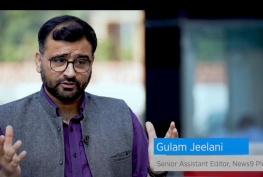Five journalists from Macedonia will join the Alfred Friendly Fellowship Class of 2018, participating in the three-week training program at the Missouri School of Journalism in the spring and working for six weeks in U.S. newsrooms.
Macedonia’s media landscape is deeply polarized along political lines, particularly in the broadcast sector, according to Freedom House. The few outlets critical of the government struggle financially, and self-censorship among journalists is common.
After participants return to Macedonia, they will be mentored by virtual trainers during the summer to help them complete an innovative media project. The Macedonia media internship project is funded through a grant from the U.S. Embassy in Skopje.
Aleksandra Denkovska Gocevska
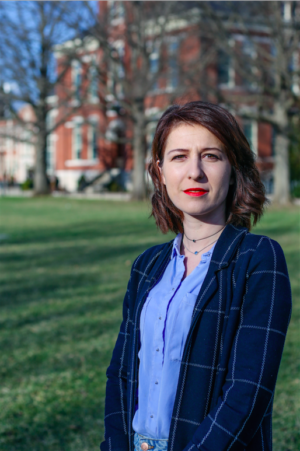 Gocevska, 30, joined two colleagues from NOVA TV this year to launch a new media organization in Macedonia called the Investigative Reporting Lab.
Gocevska, 30, joined two colleagues from NOVA TV this year to launch a new media organization in Macedonia called the Investigative Reporting Lab.
Young journalists in Macedonia lack skills and practical experience in investigative reporting methods, and that is inhibiting their professional growth, Gocevska wrote in her application essay. “Even with a university degree, journalists are provided little applicable skills to tackle real-life investigations with proper reporting.”
Gocevska was a reporter for a daily newspaper and then a news service before joining NOVA TV. Gocevska says her “real love for journalism” came during an investigative reporting training session when she heard a talk by Paul Radu, a former Alfred Friendly Fellow and a co-founder of Organized Crime and Corruption Reporting Project, a consortium operating in Eastern Europe, the Caucasus, Central Asia and Central America.
“The way he talked about his work, and how he and his colleagues worked on stories inspired me,” Gocevska said. “I knew what I wanted in life.” For her first investigative story, she went undercover to visit an institution in Skopje for children with educational and social problems.
Gocevska will work at the Pittsburgh Post-Gazette after her training at the Missouri School of Journalism.
Danche Azmanova
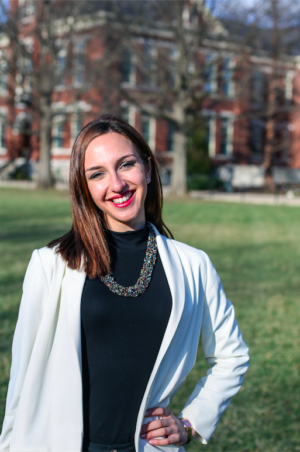 Azmanova, 25, has worked as a journalist for NOVA TV for four years. She hopes to eventually become an editor-in-chief and, in the long-term, an arbiter of media freedom for Macedonia.
Azmanova, 25, has worked as a journalist for NOVA TV for four years. She hopes to eventually become an editor-in-chief and, in the long-term, an arbiter of media freedom for Macedonia.
She said Macedonia is known as “the bad boy of the Balkans,” and she fears conditions are getting worse. With declining press freedom and revelations of government wiretapping of journalists, Azmanova said she wants to help drive the change to secure a free press for her country.
“Despite the difficulties, I am optimistic about the future,” Azmanova wrote in her application. “A new generation of journalists is emerging. I believe they will change the state of the media, with a little support. That is why we need to equip these journalists with a world-class education and an unshakable belief that what they do will make a difference. We need a free press. We must have it.”
Describing herself as an “energetic and enthusiastic person who enjoys a challenge,” Azmanova hopes to share the skills she gains through the fellowship with other Macedonian reporters by conducting workshops and writing guidebooks for ethical journalism.
“I want to be able to use media to inspire people, challenge the norm, encourage society to evolve and be a catalyst for change,” she wrote.
During the fellowship, Azmanova will work at WCSC in Charleston, S.C.
Ivan Kuzmanovski
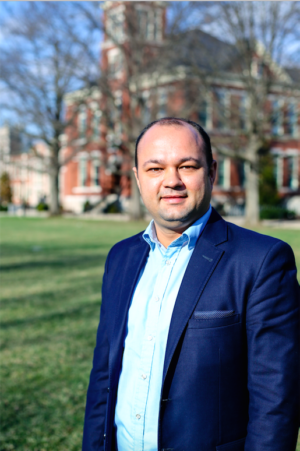 Kuzmanovski, 30, has worked as a journalist for more than 10 years, reporting from throughout the Balkan region and Europe. He has covered a range of breaking news events, from some of the worst natural catastrophes in the country to the largest migration crises in Europe.
Kuzmanovski, 30, has worked as a journalist for more than 10 years, reporting from throughout the Balkan region and Europe. He has covered a range of breaking news events, from some of the worst natural catastrophes in the country to the largest migration crises in Europe.
Kuzmanovski is currently an editor at Sitel Television, one of the most influential stations in the country. According to Film New Europe, television remains the most influential media in Macedonia, and TV Sitel was the most watched domestic TV station in Macedonia in 2015. “We would like to stay on the top,” Kuzmanovski said.
He hopes the fellowship training will strengthen his investigative reporting and computer-assisted reporting skills, two sectors that are still developing in his home newsroom, he said. He then plans to take his experiences home and share the knowledge with his colleagues.
Kuzmanovski will work at WBTV in Charlotte, N.C., during the fellowship.
Krenar Sadiku
 Sadiku, 32, founder and journalist at VFV Media, the house of the digital media sites, medial.mk and post.mk. He believes Macedonia is on the verge of a journalistic transformation and wants to be part of the movement for high-quality and ethical journalism in this new era.
Sadiku, 32, founder and journalist at VFV Media, the house of the digital media sites, medial.mk and post.mk. He believes Macedonia is on the verge of a journalistic transformation and wants to be part of the movement for high-quality and ethical journalism in this new era.
Sadiku is a life-long learner. “When it comes to knowledge, I believe there is a milestone but never a goal, you always seek more but never achieve enough,” he wrote in his application essay.
He fell in love with the profession observing his father, a journalist whom he “idolized for his courage and righteousness” in the profession.
As a child, Sadiku happened upon a student protest and after witnessing the event he found himself asking “questions with no ending.” He realized that day that he wanted to dedicate his life to finding those answers.
“[Sadiku] is the kind of journalist who never stops working, with a special interest in larger issues,” his editor Fami Bajrami wrote in a reference letter. “He is known for thinking outside the box and always giving a little more than enough!”
Sadiku will work at Missouri Business Alert and observe other online news outlets during the fellowship.
Nikola Krstikj
 Krstikj, 34, is an assistant editor and anchor for Alfa TV, a private national broadcaster. Krstikj covers current affairs with an emphasis on economic and business news.
Krstikj, 34, is an assistant editor and anchor for Alfa TV, a private national broadcaster. Krstikj covers current affairs with an emphasis on economic and business news.
The breadth of his coverage ranges from simple reporting on foreign investments to investigating the government subsidies they get, and from straightforward writing about the national budget to analyzing its impact on the overall economy and on the individual citizen. Unlike other TV stations in Macedonia where the focus of the news is daily events, Alfa TV strives to provide stories with more time-consuming in-depth analysis, he said.
“I am always encouraging the younger journalists to seek the truth, to fight for what is right and to ask for more even in the most difficult situations,” Krstikj wrote in his application essay.
The media sector in Macedonia has had its ups and downs since independence, Krstikj wrote, but in the last five to six years the situation has gotten drastically worse. The only way to break the “spiral” of government influence and pressure on reporters and editors, he believes, is to arm the next generation of young journalists with ethical and professional training and “a safety net where they can express their concerns and where they can be protected from the influence of the centers of power.”
“I firmly believe that I can contribute to the advancement and democratization of the media sector in my country, to help the news outlets achieve the role they should really have – serving the public interest, not the political and business elites,” Krstikj wrote.
Kristikj will work at KCPT, a Public Broadcasting Station in Kansas City.



